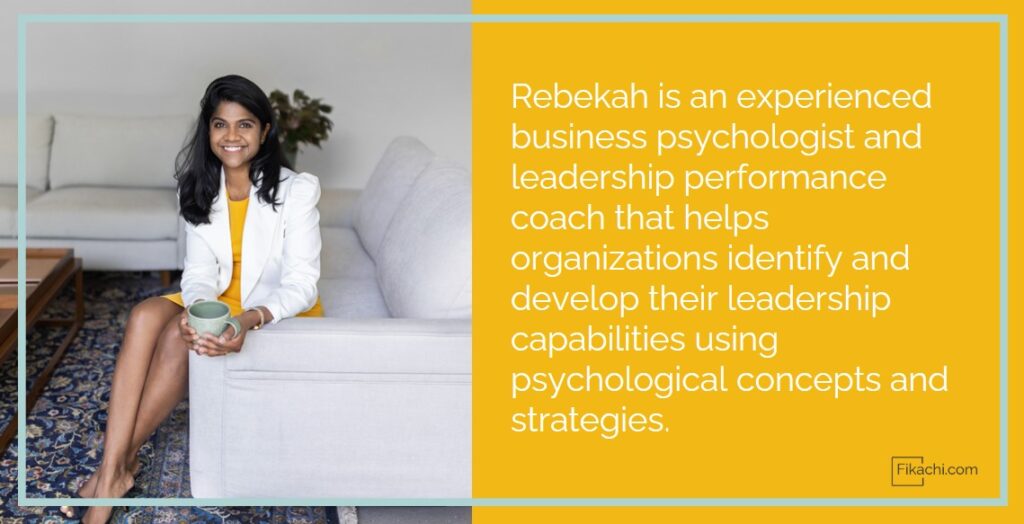Our work environments today have not only become fast paced and demanding but require us to hustle non-stop which often impacts our well-being at work. The modern workplace, with its mounting workloads and escalating employee expectations, poses a continuous struggle for leaders and those at the top. Navigating this demanding landscape is no easy feat and often affects one’s mental and emotional health.
To shed light on this important topic, we had the privilege of speaking with a seasoned business psychologist, Rebekah Ockens who specializes in equipping leaders with the tools and strategies they need to overcome these workplace challenges and find genuine workplace well-being.

She provides insights into the transformative power of positive psychology and rain-based coaching methodologies to creating emotionally mature leaders and discover their true potential.
1. Tell us a bit about yourself and how you became a business psychologist focused on well-being at work?
My fascination with human behaviour probably started rather young, I used to be really fascinated with the differences in my parents. They have very different personalities, so as a child of 3 or 4 years, I was amazed at how something that annoyed my mother to a high degree did not evoke a strong reaction with my father. I also realised, my parents behaved differently when other adults were around, or when they were busy. I soon became pretty good at knowing when to ask for extra chocolates (I am a chocoholic) or play time, knowing they were too busy speaking to other adults, which meant I could get what I want more easily.
This fascination continued growing in school – I continued to be curious at how different teachers behave different towards the same behaviour. Growing up in a multi- cultural environment in Malaysia, allowed me to also observe how different cultural norms shaped our behaviours.
I eventually turned that fascination and interest into pursuing psychology. My specific interest in business psychology was a combination of my passion for psychology and leadership behaviors. We spend 8-10 hours a day at the workplace 5 days a week. We spend more time with our managers and colleagues than with our partners, so well- being at the workplace is not a nice to have. In my perspective, it is an absolute must.
2. What inspired you to develop your vision of creating emotionally mature leaders and what psychological strategies have you found to be the most effective in achieving this goal?
That’s a great question. This came from my own experiences in corporate, I have been blessed to work with amazing leaders with high emotional intelligence and those who did not possess a high level of emotional intelligence. In my on my less positive experiences, I developed stomach ulcers resulting from the stress and toxicity of my working environment. I left this role and joined a different organisation and had the opportunity to work with emotionally intelligent leaders, those who lift you up, while pushing your boundaries to encourage growth. This personal experience served as a great inspiration to my own vision. I see this time and time again in many organisations. People thrive when they work with emotionally intelligent leaders and are in survival mode when they work in low trust, low psychological safety environments.
3. In your experience, what are some of the biggest challenges that leaders face in maintaining well-being at work?
One of the biggest challenges that leaders all over the world face when attempting to maintain well-being at the workplace is finding that real work-life balance, emphasis on real. Society has shifted the stereotype of success into such a toxic sketch of a person having to be busy without having time for family and loved ones. I see many leaders falling into this trap. As leaders, they often face high work demands, long hours, and the pressure to meet organisational goals. Balancing work responsibilities with personal and family life can be challenging, leading to stress, burnout, and neglecting personal well-being – which is what a lot of them find to be the norm, until they hit a drastic point that helps them see the importance of listening to the needs of their mind and body.

4. Can you give an example of a successful intervention or strategy you’ve used to help a leader or leadership team improve their well-being and effectiveness?
An example of a successful intervention strategy used to help a leader improve their well-being and effectiveness is centered around building self-awareness and developing trust in the workplace. Through building awareness, it allows leaders to look at their role externally instead of feeling internally absorbed to the point where they are not able to recognize their flaws. As for building trust, this is done through a series of coaching sessions or workshops around themes in communication, prioritization, and delegation.
5. In your opinion, how do you think leaders can use empathy and emotional intelligence to build stronger relationships with their team members and drive better business outcomes?
Over 16 years of experience I have seen how leaders that use empathy and emotional intelligence to create closer relationships with their team members are able to drive great business outcomes that have tremendous opportunity. Leaders may foster trust, collaboration, and progress by knowing and valuing their team’s emotions, opinions, and experiences.
Empathy enables leaders to engage with their team members on a more personal level. Leaders can display compassion and empathy by actively listening and seeking to understand the sentiments and concerns of others. This creates a psychological safe environment in which team members feel respected and encouraged, allowing them to produce their best work. When leaders demonstrate empathy, they create a secure environment for open dialogue, honest feedback, and various perspectives.
In an environment built on leadership through empathy and emotional intelligence, team members are more likely to collaborate effectively, contribute innovative ideas, and go the extra mile to achieve shared goals. As a result, productivity and performance soar to incredible heights.
6. What advice do you have for leaders who want to create a more positive and fulfilling work environment for themselves and their team members?
First and foremost, a leader needs to lead by example. So walk the talk! Model the behavior you wish to see in your team. Demonstrate positivity, integrity, and a strong work ethics.
Show appreciation for your team members’ efforts and accomplishments. When you lead by example, you inspire and motivate others, creating a ripple effect of positivity throughout the workplace.
Secondly, recognition and appreciation are essential in your workplace culture. Celebrate milestones, both big and small, this will make your team members feel accomplished and motivate them to continue driving their work with consistency and deep interest.
Create a culture where achievements are always acknowledged, and contributions are valued openly. Regularly provide feedback and recognition to inspire and motivate your team members. A culture of appreciation boosts morale, job satisfaction, and a sense of fulfilment.
And while you are at it, another powerful move is to foster a sense of purpose. Help your team members understand how their work contributes to the larger purpose and mission of the organization. Clearly communicate the goals and objectives, and how their individual contributions make a difference, this will get them individually invested in the bigger picture.
7. Can you share your thoughts on the role of mindfulness practices in promoting well-being and resilience among leaders and their teams?
Mindfulness practices play a significant role in promoting well-being and resilience among leaders and their teams. Mindfulness connects and grounds you back to the fundamentals. It allows you to tune in to the small details and appreciate them, describe them, analyse, and embrace them.
It brings you back to present moment, allowing you to focus on recentering your emotions. This can be as simple as noticing the way the bubbles of the top of your teh tarik prepares your lips for the delicious hot tea without giving your lip a shock of heat during your 3 pm tea break.
By cultivating mindfulness, leaders can enhance their own self-awareness, emotional regulation, and decision-making abilities, while also fostering a culture of well-being within their teams.
You can find out more about Rebekah and what she does here.



